Related Research Articles
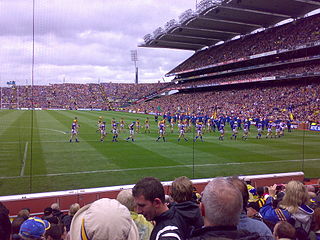
Hurling is an outdoor team game of ancient Gaelic Irish origin, played by men. One of Ireland's native Gaelic games, it shares a number of features with Gaelic football, such as the field and goals, the number of players and much terminology. The same game played by women is called camogie, which shares a common Gaelic root.
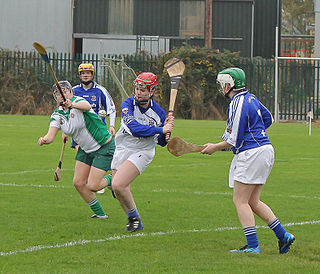
Camogie is an Irish stick-and-ball team sport played by women. Camogie is played by 100,000 women in Ireland and worldwide, largely among Irish communities.

The Gaelic Athletic Association is an Irish international amateur sporting and cultural organisation, focused primarily on promoting indigenous Gaelic games and pastimes, which include the traditional Irish sports of hurling, camogie, Gaelic football, Gaelic handball, and rounders. The association also promotes Irish music and dance, as well as the Irish language and it also promotes environmental stewardship through its Green Clubs initiative.
The GAA Hurling All-Ireland Senior Championship, known simply as the All-Ireland Championship, is an annual inter-county hurling competition organised by the Gaelic Athletic Association (GAA). It is the highest-tier competition for inter-county hurling in Ireland and has been contested in every year except one since 1887.
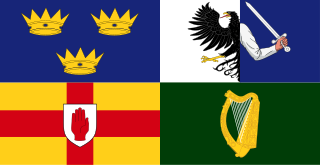
Sport in Ireland plays an important role in Irish society. The many sports played and followed in Ireland include Gaelic games, association football, horse racing, show jumping, greyhound racing, basketball, fishing, motorsport, boxing, tennis, hockey, golf, rowing, cricket, and rugby union.

The National Football League is an annual Gaelic football competition between the senior county teams of Ireland plus London. Sponsored by Allianz, it is officially known as the Allianz National Football League.

The Derry County Board of the Gaelic Athletic Association (GAA) or Derry GAA is one of the 32 county boards of the GAA in Ireland. It is responsible for Gaelic games in County Londonderry in Northern Ireland. The county board is also responsible for the Derry county teams.

The Louth County Board of the Gaelic Athletic Association (GAA) or Louth GAA is one of the 32 county boards of the GAA in Ireland, and is responsible for Gaelic games in County Louth.

The Down County Board or Down GAA is one of the 32 county boards of the Gaelic Athletic Association (GAA) in Ireland, and is responsible for the administration of Gaelic games in County Down,.

The Donegal County Board or Donegal GAA is one of 32 county boards of the Gaelic Athletic Association (GAA) in Ireland, and is responsible for the administration of Gaelic games in County Donegal.
The British Council of the Gaelic Athletic Association or Britain GAA is the only provincial council of the Gaelic Athletic Association outside the island of Ireland, and is responsible for Gaelic games in Great Britain. The board is also responsible for the British Gaelic football, hurling, camogie and ladies' Gaelic football inter-county teams.
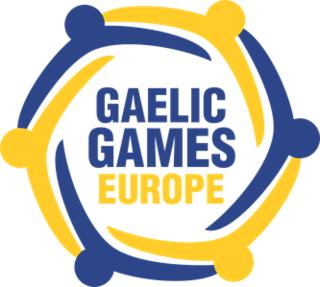
The European Board of the Gaelic Athletic Association or Gaelic Games Europe is one of the international units of the Gaelic Athletic Association (GAA), and is responsible for organising Gaelic games in continental Europe. Gaelic Games Europe is also responsible for the European Gaelic football, hurling, camogie and ladies' Gaelic football teams which compete every three years at the GAA World Gaelic Games.

The GAA Hurling All-Ireland Senior Club Championship, known simply as the All-Ireland Club Championship, is an annual inter-county hurling competition organised by the Gaelic Athletic Association (GAA). It is the highest inter-county club hurling competition in Ireland, and has been contested every year since the 1970–71 championship.
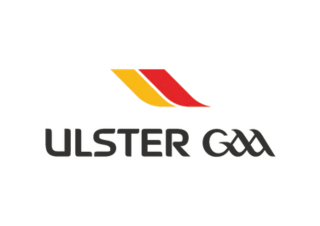
The Ulster Council is a provincial council of the Gaelic Athletic Association sports of hurling, Gaelic football, camogie, and handball in the province of Ulster. The headquarters of the Ulster GAA is based in the city of Armagh.
The Munster GAA Hurling Senior Championship, known simply as the Munster Championship, is an annual inter-county hurling competition organised by the Munster Council of the Gaelic Athletic Association (GAA). It is the highest inter-county hurling competition in the province of Munster, and has been contested every year since the 1888 championship.

The Connacht Senior Hurling Championship, known simply as the Connacht Championship, was an annual inter-county hurling competition organised by the Connacht Council of the Gaelic Athletic Association (GAA). It was the highest inter-county hurling competition in the province of Connacht, and was contested almost every year between 1900 and 1922 before a revival in the 1990s.

The GAA Hurling Under-20 All-Ireland Championship is an annual inter-county hurling competition organised by the Gaelic Athletic Association (GAA). It is the highest inter-county hurling competition for male players between the ages of 17 and 20 in Ireland. The championship was contested as the All-Ireland Under-21 Championship between 1964 and 2018 before changing to an under-20 age category from 2019.
A county is a geographic region within Gaelic games, controlled by a county board of the Gaelic Athletic Association (GAA) and originally based on the 32 counties of Ireland as they were in 1884. While the administrative geography of Ireland has since changed, with several new counties created and the six that make up Northern Ireland superseded by 11 local government districts, the counties in Gaelic games have remained largely unchanged.
A province is a geographic region within Gaelic games, consisting of several counties of the Gaelic Athletic Association (GAA) and originally based on the historic four provinces of Ireland as they were set in 1610.
The following is an alphabetical list of terms and jargon used in relation to Gaelic games. See also list of Irish county nicknames, and these are very interesting.
References
- 1 2 "Muldoon announces inter-county retirement" . Retrieved 6 April 2012.
- ↑ "1887 All-Ireland Championship". Archived from the original on 2 March 2012. Retrieved 8 January 2010.
- ↑ "Talk later" . Retrieved 8 January 2010.[ permanent dead link ]
- ↑ "The Social Significance of Sport" (PDF). The Economic and Social Research Institute. Archived from the original (PDF) on 28 October 2008. Retrieved 21 October 2008.
- ↑ "Finfacts: Irish business, finance news on economics". www.finfacts.com. Retrieved 12 April 2018.
- ↑ "Roll of honour". Archived from the original on 19 July 2008.
- ↑ "Prov Fixtures / Results". Archived from the original on 14 September 2009. Retrieved 8 January 2010.
- ↑ "GAA forms" . Retrieved 8 January 2010.
- ↑ "Increasing confidence of inter-county travel in June". RTÉ. 17 April 2021.
- ↑ "Covid restrictions: Inter-county travel, hairdressers, and non-essential retail set for May return". Irish Independent . 29 April 2021.
- ↑ "Inter-county travel and home visits among raft of re-opening measures that begin today". The42.ie. 10 May 2021.